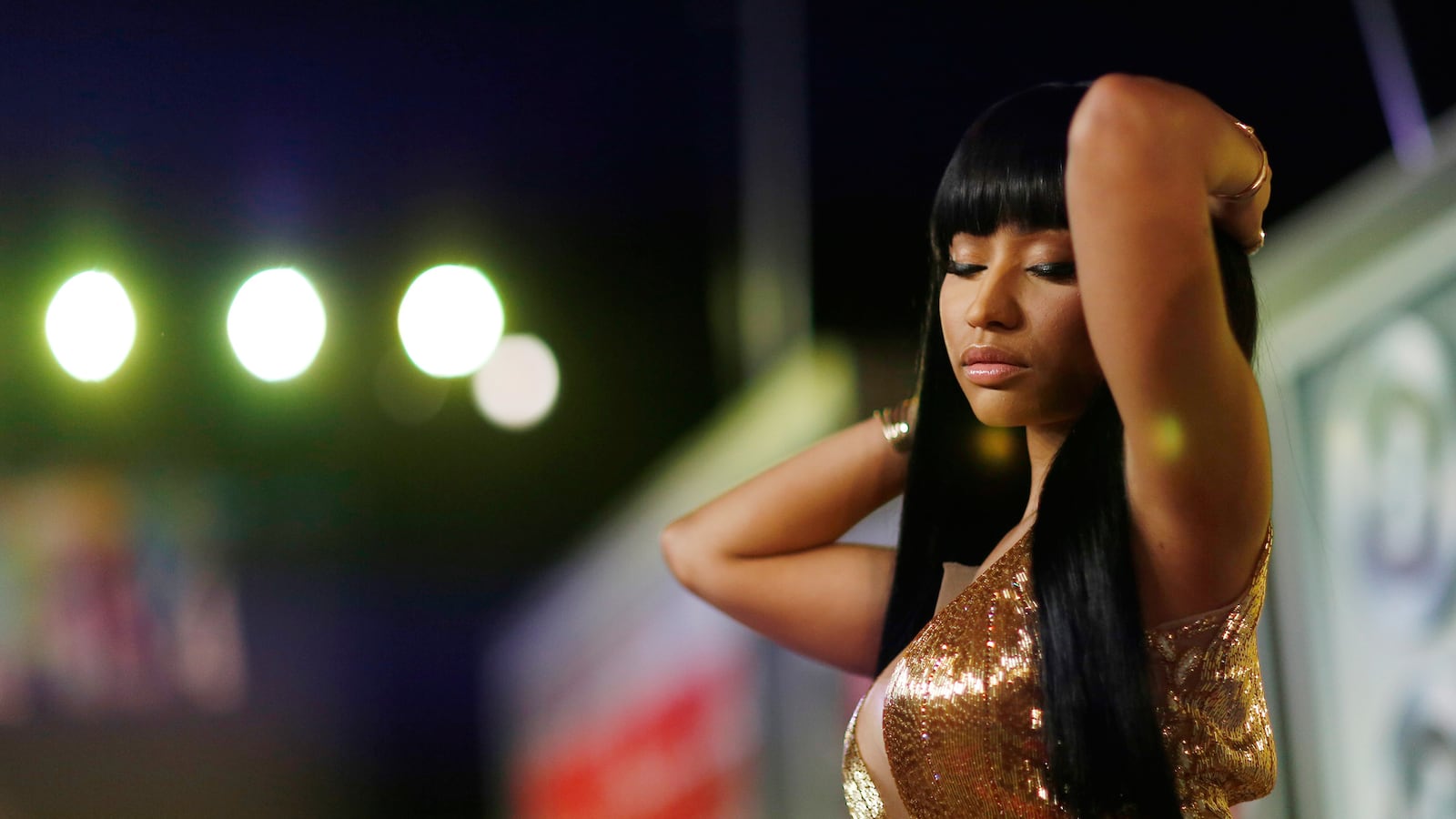According to Us Magazine, Page Six, and a bunch of other people with a lot of time on their hands, Nicki Minaj “shaded” Jennifer Lopez at the AMAs.
The alleged “shading” took place when host Lopez opened the ceremonies with a medley of the year’s biggest tracks, including Minaj’s “Anaconda.” When Minaj’s track came on, the camera panned to the star, revealing her expressionless face looking absentmindedly at the camera. What kind of shade! Apparently, this revelatory angle constitutes beef, because some people on Twitter say so and Twitter is journalism now.
While Minaj quickly dismissed the social media accusations with a pointed “lol,” that didn’t stop major media outlets from publishing articles like, “Nicki Minaj in ‘total bitch mode’ at AMAs.” Minaj most likely doesn’t have a problem with Jennifer Lopez, but it’s clear that the media has a problem with their coverage of Nicki Minaj. Whether she’s being portrayed as a troublemaker, a bitch, or a diva, the racist undertones of the overarching Minaj narrative are about as subtle as… well, Nicki Minaj.
Minaj herself doesn’t shy away from calling out rampant racism in the music industry. She famously took the VMAs to task for failing to celebrate female black excellence, tweeting, “If your video celebrates women with very slim bodies, you will be nominated for vid of the year.” “I’m not always confident,” Minaj also tweeted, “Just tired. Black women influence pop culture so much but are rarely rewarded for it.” And this is very true at the VMAs. Only eight black artists have taken home a Video of the Year trophy (compared to 32 white artists); the award for Best Pop Video has never gone to a black artist; and only five black performers (compared to 25 white artists) have taken home a lifetime achievement award.
Naturally, Minaj’s astute point was quickly manipulated into fodder for her angry black woman image.
Donald Trump Boy Friday Piers Morgan and his merry band of white allies led the charge, with the former CNN host calling Minaj a “stroppy little piece of work.” Morgan’s anti-Minaj screed went on to chastise Black Twitter, that fantastically regenerative fountain of activism, social justice inspiration, and hilarious memes.
But pasty Piers Morgan and his barely concealed prejudices are just the tip of the iceberg. In the wake of the VMAs fallout, the media was quick to amp up the volume of the alleged beef—casting Minaj, predictably, as a drama queen—while failing to articulate and acknowledge her valid points and justified irritation. An Entertainment Weekly tweet featured a photo of a pissed off-looking Minaj next to an angelic Taylor Swift; Hollywood Life cherry-picked the adjective “furious” to describe Minaj’s mood post-VMAs nominations, and captioned their click bait article “see her rant”; Radio.com called her “ballistic.”
As Minaj took to Twitter to explain, “Ryan [Seacrest’s website] posted a headline of Taylor saying she loves & supports me. But not me saying the same to her. Lol. Their headline says I took a ‘jab?’” she added, “I’m so glad u guys get to see how this stuff works. Taylor took her music off spotify and was applauded. We launched Tidal & were dragged.” In other words, white artists can do no wrong, while black artists consistently get the short end of the stick, and are publicly shamed for acting out if they even attempt to articulate their grievances.
Just as Minaj is suggesting, this isn’t the first time that the rap goddess has been publicly dragged in ways that a white artist never would. When Minaj dropped the cover artwork for “Anaconda,” a sexy snap of her enviable assets, the backlash was way harsh. The Huffington Post wrote that, “Nicki Minaj’s NSFW ‘Anaconda’ Cover Will Make Your Jaw Drop,” while The Guardian went for a judgmental/slut-shame-y one-two punch, asking, “Nicki Minaj’s Anaconda cover artwork: too racy for its own good?” In a world where white female pop stars converting their bras into sexy artillery is a fairly common occurrence, claiming that audiences will be truly “shocked” by Minaj’s butt insinuates that a black woman’s body is simply too much to handle.
Minaj didn’t take too well to this hypocrisy, posting a series of Instagrams of white and light-skinned, trim supermodels showing off their backsides in Sports Illustrated covers and photo shoots, captioned “acceptable,” before uploading her own artwork, deemed “UNACCEPTABLE.” And as if Minaj doesn’t already have enough to deal with, there’s also that small matter of Ellen DeGeneres’s Nicki Minaj parody, aka minstrel sketch.
It’s about time the media got their act together, before we all end up looking as stupid and ill-informed as Miley Cyrus in white dreads.






